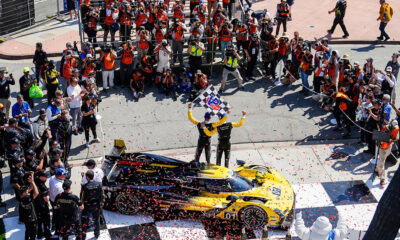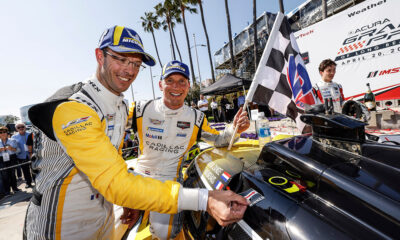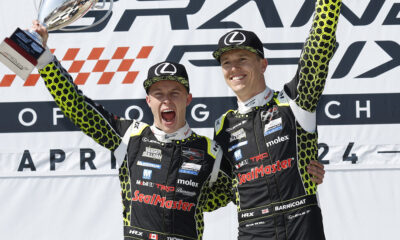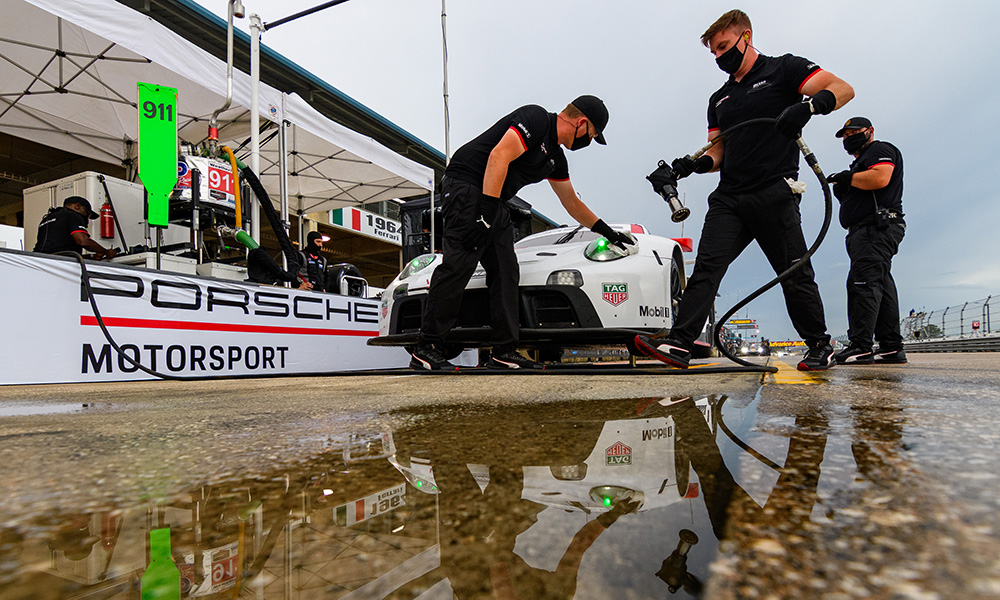
Photo: Porsche
The coronavirus pandemic has resulted in a number of creative approaches by teams and manufacturers to continue racing at the highest of levels and Porsche has been no different.
With each IMSA WeatherTech SportsCar Championship entry limited to 17 crew members, including drivers, per weekend, and the increased risks that come with international travel, the German manufacturer has established a remote “ops room” at its headquarters in Weissach to support the CORE autosport-run team during each event in the U.S..
Similar to what’s seen in Formula 1, the remote base allows for a direct line to the circuit for its German-based engineers, according to Porsche’s head of IMSA operations Steffen Hoellwarth, who had begun devising such a plan from the onset of the pandemic.
“Before we actually saw something in writing from IMSA, we came up with our own [COVID-19] protocol,” Hoellwarth told Sportscar365.
“It all started with first having a closer look at our environment and the track, like with how many working spaces we have.
“We decided, ‘OK, these are the rules that we set for ourselves when it comes to maintaining distancing and stuff like this.'”
Hoellwarth said the analysis determined they would lose about half of its existing work spaces at the track, resulting in Porsche looking at “different opportunities” such as mobile offices at the track.
Ultimately, on the grounds of cost and safety, it was decided to establish a remote ops room in Weissach.
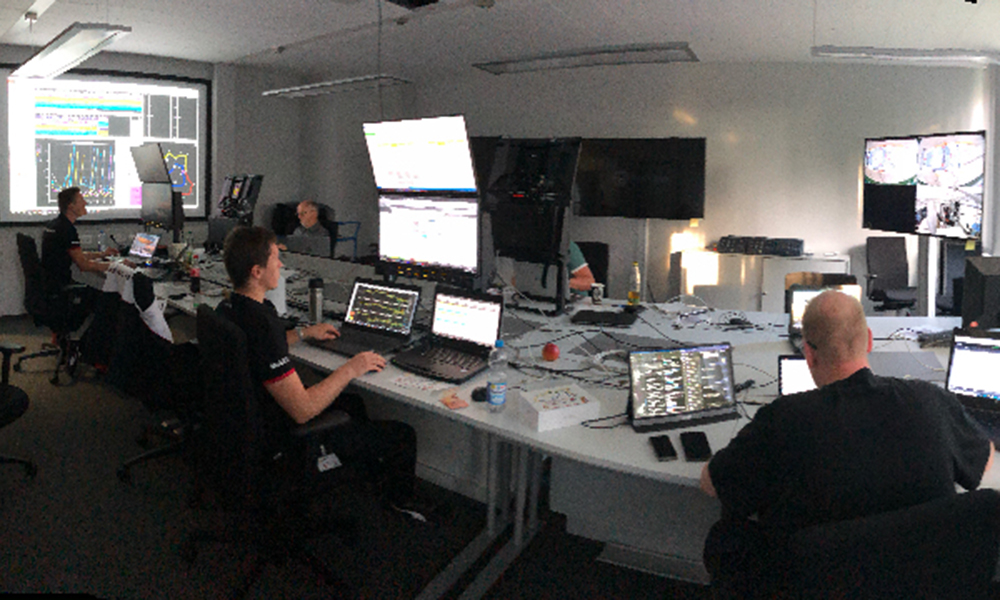
Photo: Porsche
Between five to seven staff members from Porsche AG, including performance, systems and drivetrain engineers, as well as an IT person, are stationed in the room during the WeatherTech Championship weekends, working according to the U.S. timezone the team is operating in.
Hoellwarth said they are the same personnel that typically come over from Germany with him to each event.
The ops room was first utilized during the Porsche 919 Hybrid LMP1 program, where it’s believed dozens of engineers and staff worked from.
“It was established back then as a measure to reduce costs,” Hoellwarth explained. “We were able to jump on their existing facility, hardware and equipment.
“It required some fine tuning to get the connection to the car and to the track established.
“The LMP1 program was a lot more complex so they had quite a bigger structure sitting there.
“We have less people sitting there. [Only] people who in the past were at the track are doing their job from the ops room instead.”
Earl Bamber, driver of the No. 912 Porsche 911 RSR-19, said the process has nearly been seamless from his perspective.
“On pit lane, we have our systems engineer talking to us from Germany over the intercom,” he said.
“I think everyone from CORE and Porsche have put a lot of coordinated effort to keeping everyone safe, bringing the minimum amount of people over but at the same time not lacking in any area and still having everything.
“I think it’s pretty tough for those guys, being up at 3 a.m. while we have the night races but it’s worked out really, really good.”
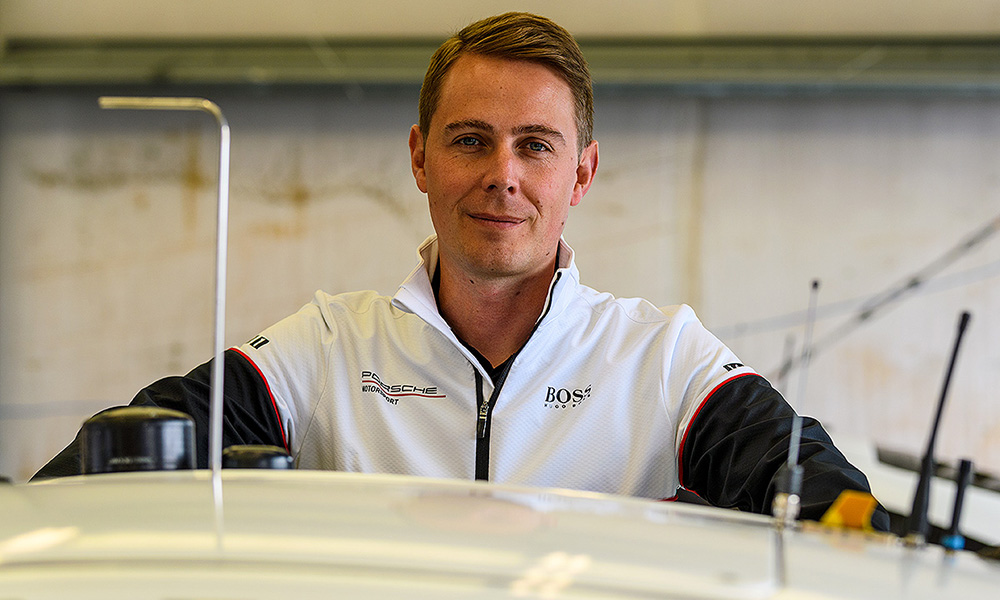
Photo: Porsche (2019 archive)
Hoellwarth (pictured above) said there have only been a few minor challenges since its rollout last month at Daytona, including internet connection issues during bad weather and a “missing pizza” for one of its remote engineers back in Germany.
“It’s a learning curve for everybody,” he said. “In the beginning we were a little bit afraid but I have to say it’s been working really well.
“After this there’s a lot of lessons to be taken away.
“We were pleasantly surprised after Daytona because the feedback from everybody was really positive. It worked out efficiently when it came to meetings and spending time in meetings.
“When it comes to communication and dealing with people [in multiple locations], I have to say we didn’t have to start from scratch. All of the meetings we do post-event are already done remote. This was nothing completely new.
“The coronavirus break was quite a good [lesson], especially when it comes to discipline when it comes to these remote meetings. Everybody was already primed and ready to go.”
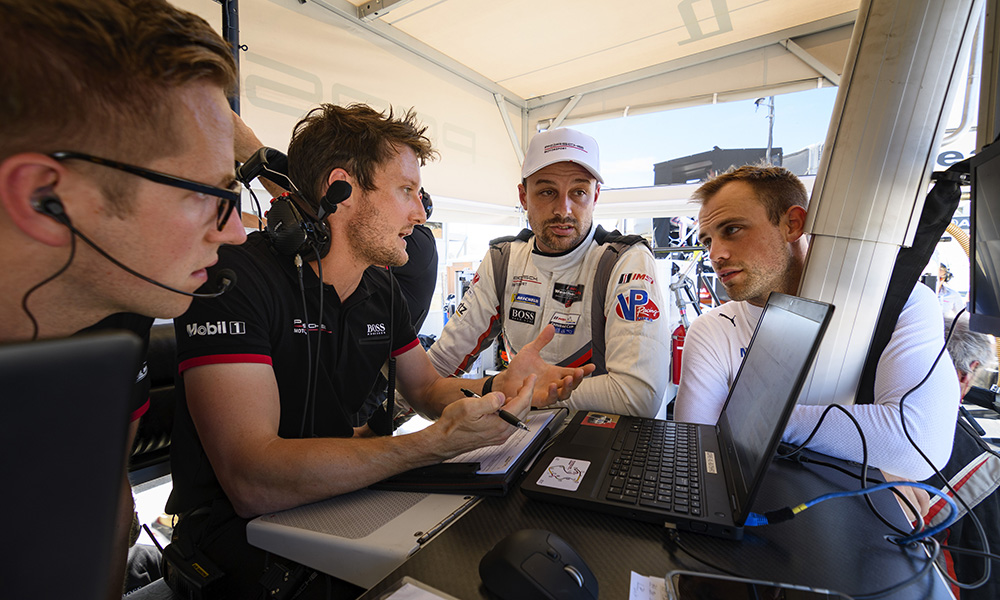
Photo: Porsche (2019 archive)
Bamber: Remote Work Will Change Motorsports
The two-time 24 Hours of Le Mans winner believes more sports car racing teams will adopt similar measures even after the pandemic ends, in an effort to reduce costs.
“I think it’s also going to change motor racing in that sense where I think you’ll see less crew and more of a ‘war room’ where people stay at home to save costs because it seems to be working quite effectively at the moment,” Bamber said.
Hoellwarth agrees.
“There is definitely a potential in there,” he said. “Travel is unfortunately getting more difficult and more and more expensive.
“For sure we’re looking into possibilities and being more flexible when it comes to supporting the races in the future.
“In the end, you don’t lose a lot of travel time. When you fly people to the U.S. and back home you lose two days just because of travel. Those two days you will not lose once you’re in the ops room.”
While plans are in place to utilize the ops room for the majority of the season, Hoellwarth said he hopes to be able to bring their entire IMSA staff to the season-ending Mobil 1 Twelve Hours of Sebring, in what will be the factory squad’s final race.
“As it’s our last season for our program, the goal will be to have the people at Sebring for the last race, in order to say a proper farewell,” he said. “But for the next events, we are not going to change anything.
“Having more people at the track is a risk [right now] when it comes to the virus situation.
“We want to keep the risk as low as possible and flying back and forth from Europe to the U.S. is not so easy anyways with the quarantine and testing that’s coming into play.”





















